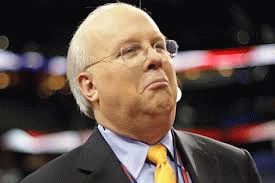Karl Rove ignored the Republican obstructionism that led to the 2011 debt ceiling crisis, falsely claiming President Obama was entirely to blame for automatic government spending cuts and misleadingly accusing Obama of hypocrisy for criticizing the devastating effects of the law.
In his July 29 Wall Street Journal column, Rove accused Obama of hypocrisy while ignoring Republican responsibility for the devastating automatic spending cuts enacted March 1 known as sequestration, claiming Obama was fully to blame for the cuts because he signed the 2011 Budget Control Act. That law raised the U.S. borrowing limit while providing the framework that ultimately resulted in sequestration:
"Mr. Obama proposed the sequester, signed the July 2011 budget agreement with its hard caps on discretionary spending, and threatened to veto any attempt to repeal or mitigate it. Nevertheless, last week he attacked the sequester as 'a meat clever' that 'cost jobs' and later told the New York Times Sunday that he's worried about 'the drop-off in government spending.'"
But Obama only signed the Budget Control Act after Republicans took the U.S. economy hostage by threatening not to raise the U.S. debt ceiling -- a measure passed to allow Congress to pay for past spending. According to a C-SPAN timeline of the debt ceiling crisis, on May 11, 2011 House Speaker John Boehner (R-OH) pledged to "not support debt limit increase without equal amounts of spending cuts." Previously, measures to raise the debt ceiling were routinely passed.
In the months following Boehner's pledge, Republicans dismissed the concerns of economists of every partisan disposition that failing to raise the debt ceiling would be catastrophic for the U.S. and world economies. A June 2011 letter to congressional leaders signed by 235 prominent economists warned:
"Failure to increase the debt limit sufficiently to accommodate existing U.S. laws and obligations also could undermine trust in the full faith and credit of the United States government, with potentially grave long-term consequences. This loss of trust could translate into higher interest rates not only for the federal government, but also for U.S. businesses and consumers, causing all to pay higher prices for credit. Economic growth and jobs would suffer as a result."
Obama ultimately signed a bill that would allow for the averting of this GOP manufactured crisis in August 2011. That bill contained the mechanism that resulted in "the sequester."
These automatic spending cuts were designed such that the consequences of letting them occur would be so severe that it would force Congress to adopt a balanced approach to spending reduction targets laid out in the Budget Control Act. Indeed, Obama and congressional Democrats made a number of proposals to avoid sequestration, but Congress failed to find an mutually-acceptable approach, with Republicans ultimately insisting that any deal only contain cuts and no revenue. Because they failed to reach a deal, sequestration went into effect.
But ignoring history and shifting blame away from the GOP and attacking Obama is par for the course for Rove. Indeed, in an August 2012 Wall Street Journal column, Rove ignored Republican obstructionism to blame Obama for failing to pass immigration reform or a deficit reduction deal, and for the debt ceiling crisis.





